Please fill out the following information, and RRFC Admissions will contact you to discuss our program offerings:
Issue #230
by Liya Swift
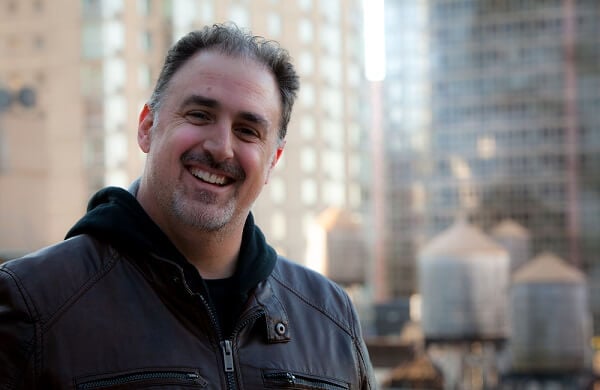
Recording Connection graduate, composer Jeff McQuilkin
We recently caught up with Recording Connection grad Jeff McQuilkin (New York, NY). Jeff first came to RRFC as a freelance writer and served as the co-editor and co-writer of this publication (and more) for a number of years. Seeing RRFC’s approach and just how effective it can be for individuals who are hungry to learn and willing to put in the hard work, ultimately led Jeff to become a student himself.
As well as a gifted writer, Jeff is a lifelong musician, composer, and pianist. When his college-aged son started directing film, Jeff found himself involved in scoring the music. The Recording Connection mentors who trained Jeff in our Audio Engineering & Music Production program were able to meet Jeff on his level and help him to elevate his skills and savvy.
Now, Jeff’s got a booming career composing original music for film, television, and media. Read on to learn more about how Jeff turned his goals into surefire reality, one smart decision at a time.
So Jeff, you scored your fifth short film last year which is currently making the festival rounds. How did you land that project?
“I met an independent writer/director here in New York at a networking event, and we chatted it up for a while and hit it off. He was in the postproduction phase for his short film. I told him a little bit about what I do, my vision for helping to elevate projects for the purposes of improving their chances of getting into film festivals and that kind of thing…”
So a few weeks later he reached out to me and said, ‘I’ve listened to everything on your website. I love what you do. I want you to score this. So interestingly enough, it’s a 20 minute film and it’s almost entirely silent, so there’s more than 15 minutes of music in there. So yeah, we completed it last year, and it’s gotten into a couple of festivals and he continues to send it out, and probably the most significant thing is that locally it got placed on an online festival… He actually won in his category for dramatic film. So his short film (“Ode to An Urn”) now gets to play on Roku for a year.”
You moved to New York City three years ago. Since then, you’ve had 35 placements of your music on television shows including American Pickers and The Filthy Rich Guide. How did you do it?
“I work with a music supervisor that has a music library that is exclusive to those shows and a few others, and they’re always looking for new shows, and they’re also exclusive to their artists… Optimally, if you’re going to write music for a music library, you want to write for something that’s exclusive. In other words, the music you send them can only be used by them. And while that may restrict your ability to get your music to a lot of different places, the libraries that are exclusive tend to be more aggressive with the placement. So that is why I have written so far about 70 tracks for this library, and I have 35 placements to show for it…One of the benefits, is that they give me very specific information about what type of music they’re looking for, they send me regular briefs about what the show runners are asking for, and then as long as I’m writing in that vein and mixing it properly, then they have a high probability of placement.”
Has making connections really been an important ingredient in your success?
“The music supervisor that I met [and work with] came to a networking event, [so that] came from making connections. This director came from making connections…That’s what we always have talked about with RRFC is that it’s a relationship-based industry. So far that has proven true for me. All the gigs that I have gotten as a composer have come from forming relationships and working on those relationships.”
Just off the top of your head, what are some of the opportunities today for music composers?
“There are some people that will say that the field is way too crowded, that there are more composers than ever before, and so it’s harder than ever to get a gig. Generally I find the people saying that are composers that are having a hard time getting a gig, and there may be other reasons for that. The reality is, yes, there are more composers than ever before, but there is so much more content than ever before. And so it’s not like composers have nothing to do. In fact, so many of the composers that I know that are doing this full-time, they’ve got more work than they can handle.”
Why is having an original film score advantageous for filmmakers?
“Obviously no guarantees, but if you have a good original score, if you score a picture, it has a lot more production value than just picking music from libraries and that kind of thing, which [is what] a lot of low budget projects do.”
If one were to approach doing a film score, what do they need to keep in mind while they’re working on it?
“Probably the best answer I can give is, you are in a collaboration when you’re scoring to film. It is the director’s baby…The director’s going to have the final word. So it requires being a team player, it requires being flexible, and most importantly it requires being able to write music that serves the film, not that highlights you as an artist…
Have a spirit that is willing to serve the film, meaning that for passages [where] music gets in the way, you’re willing for it to be silent. You are willing to edit out your own stuff, if need be, to make sure that whatever you’re contributing helps tell the story better.”
What’s been your biggest takeaway since doing Recording Connection?
“So the biggest takeaway, besides obviously the need to form working relationships, is that it really did help me with my mixing skills. [It] helped me know my way around the studio, which was something I was not very familiar with before I went into the program…
I was in the process of scoring one of my son’s short films, and [my mentor] actually helped me record that score and mix it as part of my studies. So that ended up being really good because it helped me focus on the stuff I want to do in the studio, which is score a film and then mix it… (Watch “Sic Transit Glory“)
And probably one of the best little nuggets I got from [mentor] Jesse O’Brien at Colorado Sound was, early in the session he showed me around the control room at the studio, and then he mentioned how he mixes, and he pulled out this set of older, beat-up speakers, and he said, ‘These speakers are awful, but they are my favorite thing to mix on because I know how to make the adjustments and I know their strengths and weaknesses. They have become my tool, my instrument for mixing.’ And he said, ‘If I can make a mix sound good on these speakers, they’ll sound good everywhere.’ So he was the one that said, ‘Don’t worry about getting the most expensive gear. Find a good frame of reference for you, find out the strengths and weaknesses, and mix in that realm.’”
What’s your advice to Recording Connection students on how they can make the most of their externship experience?
“For this brief window of time, you have access to equipment and most importantly to expertise that doesn’t come around to everyone…Ask lots of questions, not during the sessions, after the sessions. Just do the best you can. Try to make yourself an asset in the studio. The idea is you take that window and you try to become a fixture…
You really have this unique window of opportunity for however long you’re in the program…Be there as often as you can. Glean everything you can from it and just keep your ears open.”
View Recording Connection’s in-industry programs.
Learn more about Jeff McQuilkin at jeffmcquilkinmusic.com.
The “Ode to an Urn” soundtrack is available on CDBaby, iTunes and Spotify.
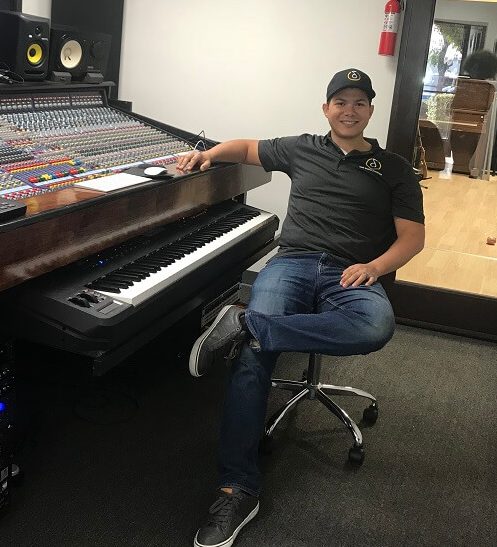
Recording Connection mentor Joel Valera
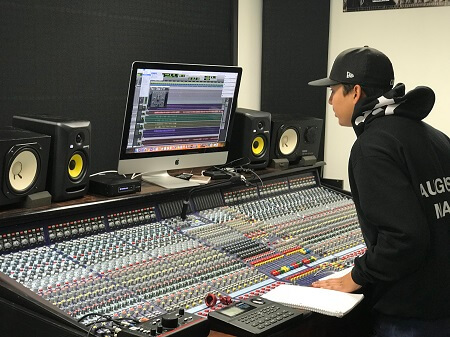
Recording Connection student Adrian Lopez
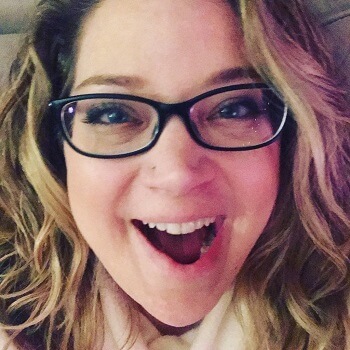 Film Connection student Johanna Bradford has earned her first IMDb credit! Showing she was willing to work hard had everything to do with her accomplishment. Johanna shares the latest news in her recent blog post:
“My work ethic from a previous project with my previous mentor impressed a producer enough to invite me to work on a music video…The video/song is launching on NPR. I’m still sworn to secrecy at this point…Also, I now have my first IMBb credit…”
Film Connection student Johanna Bradford has earned her first IMDb credit! Showing she was willing to work hard had everything to do with her accomplishment. Johanna shares the latest news in her recent blog post:
“My work ethic from a previous project with my previous mentor impressed a producer enough to invite me to work on a music video…The video/song is launching on NPR. I’m still sworn to secrecy at this point…Also, I now have my first IMBb credit…”
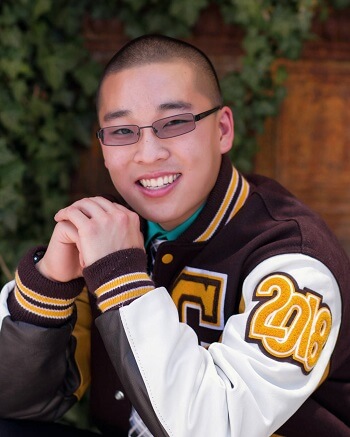 A lifelong musician, Recording Connection student Matthew Nichols plays piano, bass, percussion, and guitar as well as sings. Now he’s learning how to engineer and produce his own music:
“So I just got back from the studio. Today, my mentor and I did some music and worked on my original song. I made some improvements, added some things to finish the basic layout. I haven’t come up with a name for the song yet, but I am looking for something that makes sense. So, I had a good day today and yeah, I hope to finish [it] soon!”
Congrats to Johanna and Matthew on taking the initiative to go after what you want.
*Attention RRFC students: Would you like to be in our newsletter? Blog about your experiences, tell us your story!
A lifelong musician, Recording Connection student Matthew Nichols plays piano, bass, percussion, and guitar as well as sings. Now he’s learning how to engineer and produce his own music:
“So I just got back from the studio. Today, my mentor and I did some music and worked on my original song. I made some improvements, added some things to finish the basic layout. I haven’t come up with a name for the song yet, but I am looking for something that makes sense. So, I had a good day today and yeah, I hope to finish [it] soon!”
Congrats to Johanna and Matthew on taking the initiative to go after what you want.
*Attention RRFC students: Would you like to be in our newsletter? Blog about your experiences, tell us your story!
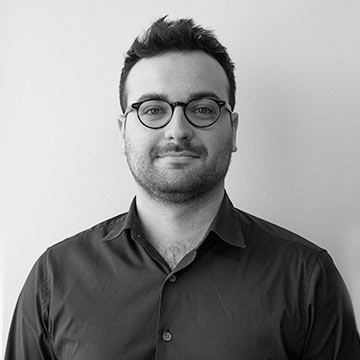
Gervais Maillard, Lead Career Services Advisor, RRFC.

RRFC is education upgraded for the 21st century.
Get the latest career advice, insider production tips, and more!
Please fill out the following information, and RRFC Admissions will contact you to discuss our program offerings:
Stay in the Loop: Subscribe for RRFC news & updates!
© 2025 Recording Radio Film Connection & CASA Schools. All Rights Reserved.
